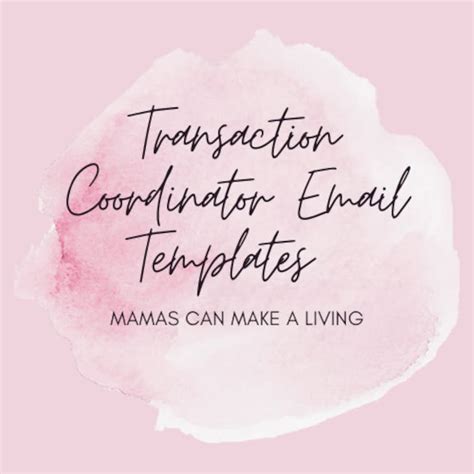Transaction coordinators play a vital role in ensuring the smooth execution of real estate transactions. One of the key responsibilities of a transaction coordinator is to maintain effective communication with all parties involved in the transaction. This is where email templates come in handy. Email templates for transaction coordinators can save time, reduce errors, and improve communication. In this article, we will explore the importance of email templates for transaction coordinators and provide examples of templates that can be used in various scenarios.
The Importance of Email Templates for Transaction Coordinators
Email templates are pre-drafted emails that can be used as a starting point for communication with clients, agents, and other stakeholders. Using email templates can help transaction coordinators to:
- Save time: Email templates can be quickly customized and sent, reducing the time spent on writing emails from scratch.
- Reduce errors: Email templates can help ensure that all necessary information is included in the email, reducing the risk of errors or omissions.
- Improve communication: Email templates can help to ensure that communication is clear and consistent, reducing the risk of miscommunication or misunderstandings.

Email Templates for Transaction Coordinators
Here are some examples of email templates that can be used by transaction coordinators:
Template 1: Introduction Email
Subject: Introduction and Welcome to [Company Name]
Dear [Client/Agent Name],
I hope this email finds you well. My name is [Your Name], and I am the transaction coordinator assigned to your [buying/selling] transaction with [Company Name]. I will be working closely with you to ensure a smooth and successful transaction.
Please feel free to reach out to me with any questions or concerns you may have. I am here to help.
Best regards, [Your Name]

Template 2: Contract Review Email
Subject: Contract Review for [Property Address]
Dear [Client/Agent Name],
I hope this email finds you well. I have reviewed the contract for [Property Address] and have noted the following:
- [Insert any notable points or concerns]
Please review the contract and let me know if you have any questions or concerns.
Best regards, [Your Name]

Template 3: Due Diligence Email
Subject: Due Diligence for [Property Address]
Dear [Client/Agent Name],
I hope this email finds you well. As we move forward with the transaction, I wanted to remind you of the following due diligence items:
- [Insert due diligence items, such as inspections or appraisals]
Please let me know if you have any questions or concerns.
Best regards, [Your Name]

Template 4: Closing Update Email
Subject: Closing Update for [Property Address]
Dear [Client/Agent Name],
I hope this email finds you well. I wanted to update you on the status of the closing for [Property Address]. We are currently [insert current status, such as "awaiting final approvals" or "scheduled for closing"].
Please let me know if you have any questions or concerns.
Best regards, [Your Name]

Best Practices for Using Email Templates
While email templates can be a valuable tool for transaction coordinators, there are some best practices to keep in mind:
- Customize the templates: While email templates can save time, it's essential to customize them for each transaction and client.
- Use clear and concise language: Avoid using jargon or technical terms that may be unfamiliar to clients.
- Proofread: Always proofread emails before sending them to ensure accuracy and professionalism.

Conclusion
Email templates can be a valuable tool for transaction coordinators, helping to save time, reduce errors, and improve communication. By using the templates provided in this article, transaction coordinators can ensure that their emails are clear, concise, and professional. Remember to customize the templates for each transaction and client, use clear and concise language, and proofread before sending.















What is the purpose of email templates for transaction coordinators?
+Email templates for transaction coordinators are designed to save time, reduce errors, and improve communication with clients and agents.
How can I customize email templates for transaction coordinators?
+You can customize email templates by inserting the client's name, property address, and other relevant details.
What are some best practices for using email templates for transaction coordinators?
+Some best practices for using email templates include customizing the templates, using clear and concise language, and proofreading before sending.
